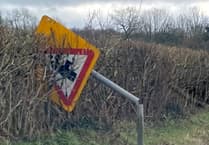THINK of Tenby and you automatically think of beaches and spectacular views, but the town has had more than its fair share of famous residents over the centuries...
Robert Recorde
Robert Recorde was born in Tenby in circa 1512, but died in King Bench debtors prison, Southwark in 1558.
Recorde was the first mathematician to write mathematical books on algebra and arithmetic in English, when traditionally they were written in either Greek or Arabic. He also invented the equals (=) sign, which featured first in his book The Whetstone of Witte which was published in 1557. About the equals sign, he wrote:
And to avoide the tediouse repetition of these words: is equalle to: I will sette as I doe often in woorke use, a paire of paralleles, or Gemowe lines of one lenghte, thus: =, because noe. 2 thynges can be moare equalle.
For those of you who have studied Shakespeare, you might know that the language of the 16th century is very different to what we use today, but essentially, what he says is that he thought that two sideways lines were the simplest way of showing what equal meant, because they both looked the same!
So aside from creating the equals sign for the whole world, why was the math of Robert Recorde so important for Tenby?
Tenby was of course, a small and bustling town back in 1500. Remotely situated and difficult to reach by road it was a popular port visited by ships from both far away and near places. Its harbour attracting traders and merchants seeking to sell an buy a wide range of goods.
The success of the town depended on the trading skills of its businessmen. The port officials were also busy collecting taxes from the visiting ships, which also helped. The common people, referred to by Recorde as ‘the unlearned sorte’, needed a wide range of mathematical skills to be able to go about their business, including keeping accounts and ledgers, exchanging currencies, and weighing and measuring of all kinds using a bewildering mixture of units. Without these, it would be very easy to get tricked by greedy merchants, or to get in trouble for not paying enough taxes to the port officials.
The legacy of mathematicians such as Robert Recorde continues in our daily lives whether we are conscious of the influences or not. In his work Recorde wrote about numerous mathematical methodologies, ranging from algebra, square root, geometry, trigonometry, proportion and ratios.
On Wednesday, November 1, Robert Recorde’s book The Castle of Knowledge went under the hammer at Hansons Auctioneers. It sold to an international bidder for £10.000!
Peggy Davies
With the increase in visitors to Tenby came the increase in those wanting to take a dip in the sea. Of course, not everyone could swim and many had a fear of the water. Being shocked by the cold, bathers often required assistance from a ‘dipper’. These were usually women, dressed in rough flannel, who would help bathers into the water and then push them under the surface, while keeping a firm grip to ensure they did not drown.
Consequently people such as Peggy Davies provided a valuable service to those who could not swim, by helping them enjoy the benefits of sea-bathing. Peggy actually was Tenby’s most famous bathing machine woman, and there is a memorial tablet to her in St Mary’s Parish Church, which reads: ‘This tablet was raised by a few Ladies and Gentlemen to preserve from oblivion the Memory of PEGGY DAVIES. Bathing woman 42 years to the Ladies who visited TENBY. Her good humour, respectful attention and Gratitude made her employers – Friends. On the 29th of Sept 1809. In the Water she was seized with Apoplexy and expired, aged 82.’
In a time when life expectancy was only around 50-60 years of age many thought that Peggy was a true example of the benefits of sea-bathing for health giving reasons!
Gwen and Augustus John
Gwen John was born in Haverfordwest and spent her childhood in Tenby. After attending the Slade School of Art in London she lived much of her life in France, where she modelled for renowned sculptor August Rodin and established a reputation for herself as a formidable artist.
Her reputation is international, with her works hang- ing in galleries all over the world, from America to, well Tenby! Her work has actually been shown as far afield as Hawaii, New York, Norway, Canada, Massachusetts and Vienna in Austria.
During her lifetime she was overshadowed by the reputation of her more flamboyant artist brother, Augustus, but critical opinion now tends to view Gwen as the more talented of the two.
As a woman in a career that was, during her lifetime, still largely dominated by men, Gwen had to fight for appreciation, with artworks that were in turn placid and potent with her own emotional intensity. The Daily Telegraph reviewed Sue Roe’s 2011 biography of Gwen by stating, “her latest biographer makes it very plain that it was precisely this obdurate refusal to conform to any socially acceptable female norms that enabled Gwen to compete as an artist on equal terms with men.”
Augustus John was born in Tenby and also attended the Slade School of Art, where he established a reputation as a draughtsman of immense skill. Despite his reputation going through various and often rigorous scrutiny, he is widely regarded as one of the most important painters of the twentieth century.
He was radical and wild in nature, a true Bohemian, but he executed some of the finest portraits of the 20th century, including major pieces of Dylan Thomas, David Lloyd George, WB Yeats, Thomas Hardy TE Lawrence.
Augustus had a brilliant understanding of colouring and paint application and was described as “the best draughtsman since Michelangelo.”
In 1959, Augustus John was granted the Freedom of the Borough of Tenby and today on a winter stroll through the town you will be able to see two blue plaques in the town dedicated to him.
William Paxton
William Paxton was a wealthy London banker who lived at Middleton Hall in Carmarthenshire. He had made his money in India. He realised that wealthy visitors would come to Tenby if services were made available, so he convinced the town council that new facilities were needed.
The council provide support for developing the resort. Paxton’s first bath-house burned down but he rebuilt at Laston House in Castle Square. The build- ing still stands, bearing the Greek inscription over the entrance, which translates as ‘The sea cleanses all man’s pollution’.
Paxton also financed new roads and fresh water systems. However these new developments created a social gap in the town with the poorer fishermen and their families living in the harbour area where the fashionable visitors were conducted away from such sights even if it is one of the most iconic sights in Tenby now.
By the 1900s, Tenby catered for holidaymakers from all social backgrounds, and smaller, less expensive lodging houses became available. Shops selling beach goods and souvenirs appeared.
The work that Paxton started in making this town a resort can still be felt today, where tourism remains the main industry.
F B Mason
Frank Britten Mason took ownership of the Tenby Observer newspaper in 1881 on the death of his father, Richard. In 1895 he took over the editorial role. In 1907 he attended a town council meeting and when he published his report the council took exception to his tone. This issue was brought up at the following meeting but as it was not an agenda item, further discussion had to be postponed until the following meeting. Here a resolution was passed that, due to Mason’s report and ignorance of shorthand, he was to be refused entry to any further council meetings, a resolution that the High Court would go on to describe as ‘amazing’.
Mason was permitted to send a qualified representative of the Tenby Observer. He wrote a letter stating that he as not to be refused entry and informed the Council that he would be attending the next meeting as part of his rights. The case extended to the wider presses. Mason did attend the meeting, bringing his own chair with him. The council asked him to leave. He refused, and the meeting was adjourned. The council tried to serve him with a motion restraining
him from trespassing on their property and attending their meetings but the Chancery Division of the High Court refused to grant the Council’s motion. The case later went to trial and Mason won. As a result, Parliament passed the Admission of the Press Bill.
So Mason is important because his name will forever be associated with the Freedom of the Press, and even today the Tenby Observer newspaper proudly boasts it is the ‘Pioneer of Press Freedom’ and a plaque outside the paper’s Warren Street office recalls the landmark ruling.




